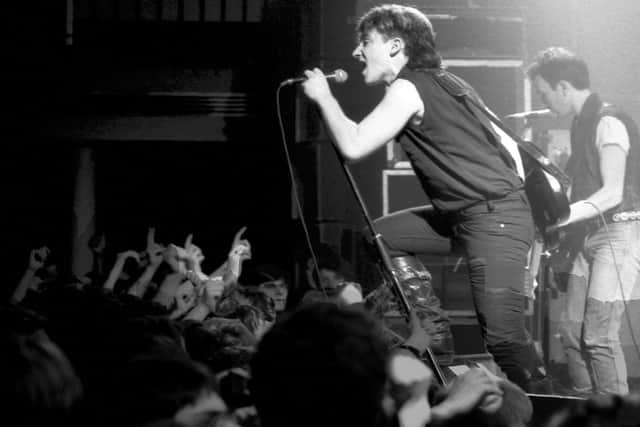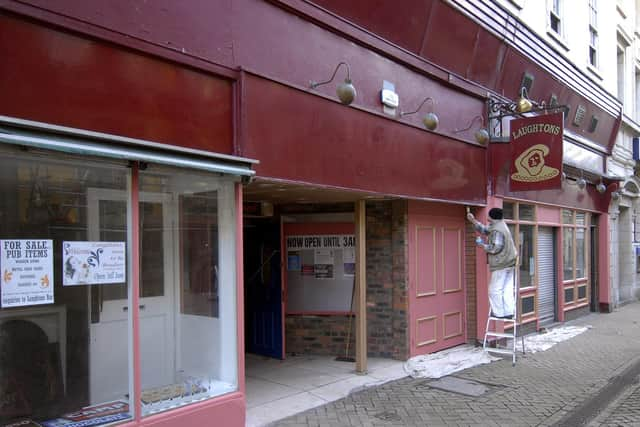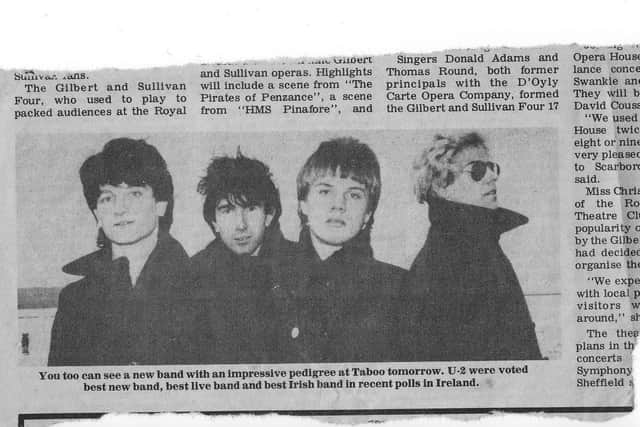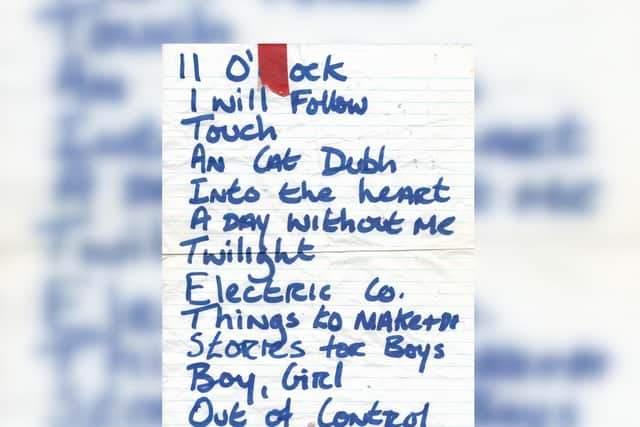Remembering 40 years on: The night U2 played in Scarborough
and live on Freeview channel 276
Here, PATRICK ARGENT vividly recalls the night he observed an early live incarnation of U2.
Late on the evening of Friday 12th September 1980, a semi-obscure Irish post-punk band from North Dublin would take to the stage in a modestly-sized Scarborough club in front of approximately 40 people.
Advertisement
Hide AdAdvertisement
Hide AdComprising band members Adam Clayton, David Evans, Paul Hewson and Lawrence Mullen Jr, they would emerge unassailably in a relatively short period of time into an unbridled rock leviathan, whose worldwide tours would match the enormous scale and excess of The Rolling Stones.


That band, U2, announced rather unassumingly in the pages of the Scarborough Evening News the day before, were to play at Taboo rock club, mid-way along Huntriss Row in the town centre.
In an accompanying advert for the venue, U2 were billed rather bizarrely as ‘The Band from Guinness Land’.
Apart from some relatively scant coverage in the British music press, for most, little if anything was known about them prior to their appearance.
Advertisement
Hide AdAdvertisement
Hide AdEarlier that evening, winding their way up the narrow staircase entrance, few if any of the sparse audience knew that the gig they were about to witness would be such an unforgettable, rarefied and exceptional music event.


Gathered patiently at the front of the small stage in anticipation just prior to the show, nobody at that moment had much idea as to what to expect.
Introduced briefly by club DJ John Silk, the band arriving on stage from the very outset would make an immediately felt impact.
Punctuated sharply by The Edge’s idiosyncratic and strikingly original guitar sound, it became clear that even within the confines of just the first number, their music possessed a certain compelling allure.
Significantly, they sounded like no other band.


Advertisement
Hide AdAdvertisement
Hide AdTaut, powerful, aggressive and exuberant, their impassioned dynamic and fast-paced performance was one that had been comprehensively honed by innumerable previous gigs on the Dublin and Irish live circuits.
Running through the bulk of what would comprise their forthcoming debut LP, it was evident that these were incisively-executed numbers by musicians with a very distinctive repertoire.
Ever the self-confident frontman, Bono would effortlessly command every second of their 50-minute show with a naturally adept skill for communication combined with an irrepressible showmanship.
Former Taboo staff member, technician John Boak, recalled: “Coming from Ireland, nobody in the club that night had heard of them before. Really in a way to me, they were a punk band, very loud, energetic and very visual. I remember Bono, tall with dark spikey hair, bouncing all over the place. He held the show together completely and had real stage presence.”


Advertisement
Hide AdAdvertisement
Hide AdAvid music fan Steve Wackett recollects the gig clearly: “I went along with Patrick to see U2 at Taboo having heard ‘11 O’Clock Tick Tock’ on John Peel’s radio programme.
“I think because they were starting out and had not yet released any material in the UK, they were relatively unknown which led to a mediocre turnout.
“We were both at the front of the stage and I can’t remember there being many people around us.
“Bono was definitely the showman, at one point even climbing up the back of the stage set to the overhanging balcony above, but I was more impressed with The Edge and his guitar style and the sound he was getting.”
Advertisement
Hide AdAdvertisement
Hide AdThe Edge, an unpretentious, fluid virtuoso resplendent in jeans covered in a mass of biro pen graffiti, created a whole spectrum of extraordinarily unexpected sounds that continuously emanated from his guitar amp. It was mesmeric to watch.
With the robustly solid rhythm section of bassist Clayton and drummer Mullen Jr., the band were a highly focused, cohesive unit that exuded an understated
assurance in the performance of their art.
Steve Wackett added: “Bono did get a bit tetchy with the audience because of the lack of response.
“At the end of the gig Bono climbed off the stage and thanked both of us and that’s when I decided to take his set list that was taped to the floor.”
Advertisement
Hide AdAdvertisement
Hide AdDespite the rather muted initial reaction from a number of the small audience, the crowd, eventually acknowledging the quality and uniqueness of what they were hearing, would demand an encore.
This early manifestation of U2 was arguably when they were at their most potent, vibrant and exciting as a live band. The pace, intensity and freshness of their approach and material was a revelation at a time when the predominant direction of much of the post-punk genre was with more serious, introspective bands such as Joy Division and The Comsat Angels.
Taboo owner Ken Golightly and manager Brian Lister had unwittingly booked what soon after would become not only a leading band in the vanguard of the new wave, but also emerge quickly as an unstoppable international force on the live music circuits on both sides of the Atlantic.
Observing over the previous years the considerable success in Britain of their fellow Dubliners Thin Lizzy, U2 had retained a fierce ambition to emulate their achievements.
Advertisement
Hide AdAdvertisement
Hide AdHaving established a formidable reputation as a live outfit in Ireland, their Scarborough appearance was a very early part of a debut tour of England in support of their forthcoming LP.
Beginning a few days before, the Taboo performance was only the fifth booking of an extensive expedition, which consisted of 157 dates in five legs over a period of 10 months, and also included forays to the Continent and North America.
Recorded earlier that year, that LP, ‘Boy’, was released in this country in late October 1980 by Island Records, gaining much critical acclaim.
Coincidentally, a live performance of ‘11 O’Clock Tick Tock’, which was featured on the BBC’s rock show The Old Grey Whistle Test in 1981, was issued last month on blue vinyl marking Record Store Day.
Advertisement
Hide AdAdvertisement
Hide AdFormed in 1976, U2 are one of those exceptionally rare bands still active today who retain their original line-up of over 40 years ago (the inimitable Killing Joke being another).
Taboo staged many other notable gigs in its four-year tenure as a live venue in the town between 1979 and 1983.
Punk pioneers Generation X, fronted by Billy Idol, Eddy Grant and the UK debut of The Dead Kennedys were amongst a host of other notable bands drawn mainly from the then contemporary new wave/alternative scene, to play at the club.
Similarly, in experiencing the Sex Pistols’ thunderously nihilistic and unparalleled appearance three years earlier in August 1977 at The Penthouse, the memory of U2’s electrifying performance at Taboo still resonates profoundly with me to this day.
Advertisement
Hide AdAdvertisement
Hide AdIt was a consummate demonstration of the exhilaration, expressiveness and power of original live rock music as a supreme art form.
Talking briefly to my Dublin compatriots outside prior to them leaving the venue, perhaps with hindsight now, I should have emphatically insisted that they were going to be needing an additional tour manager and that I was the right candidate for the job.
Watching U2 depart in their small van, I thought that it would be most unlikely for them to be appearing at Taboo again as they inherently possessed that elusive distinctive quality that all great bands have.
In the context of their humble beginnings of which the Scarborough gig was a small part, such was the inexorably meteoric rise of U2’s popularity worldwide over the immediate subsequent years, it is difficult to quantify the sheer magnitude of their global success.
From the minute stage at Taboo in Huntriss Row on September 12th 1980 to the front cover of Time Magazine on 4th April 1987.